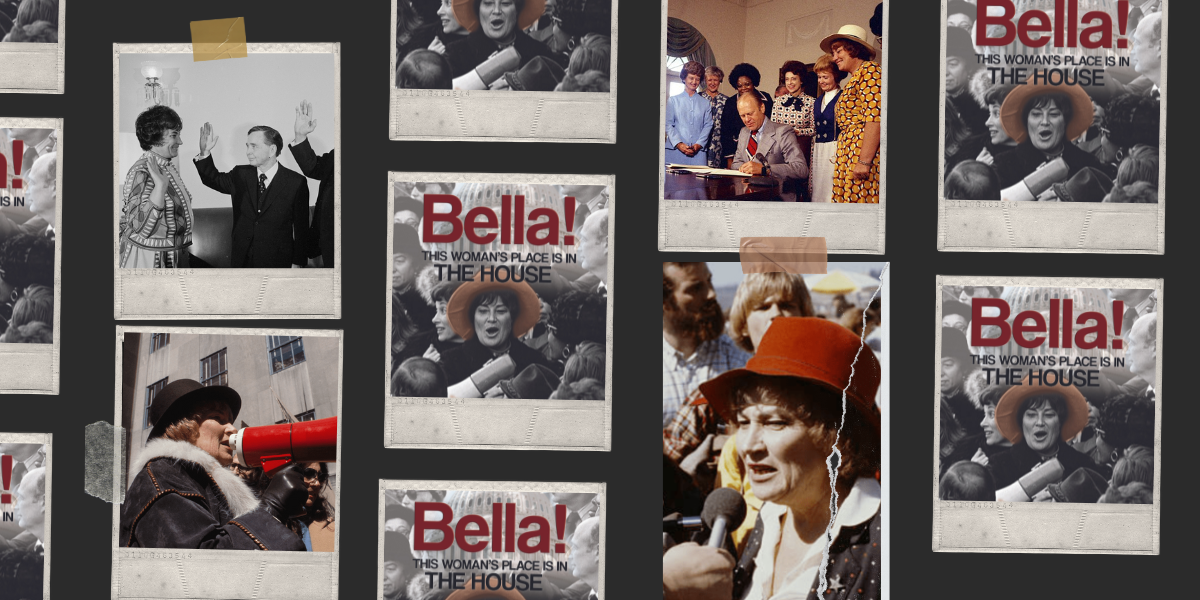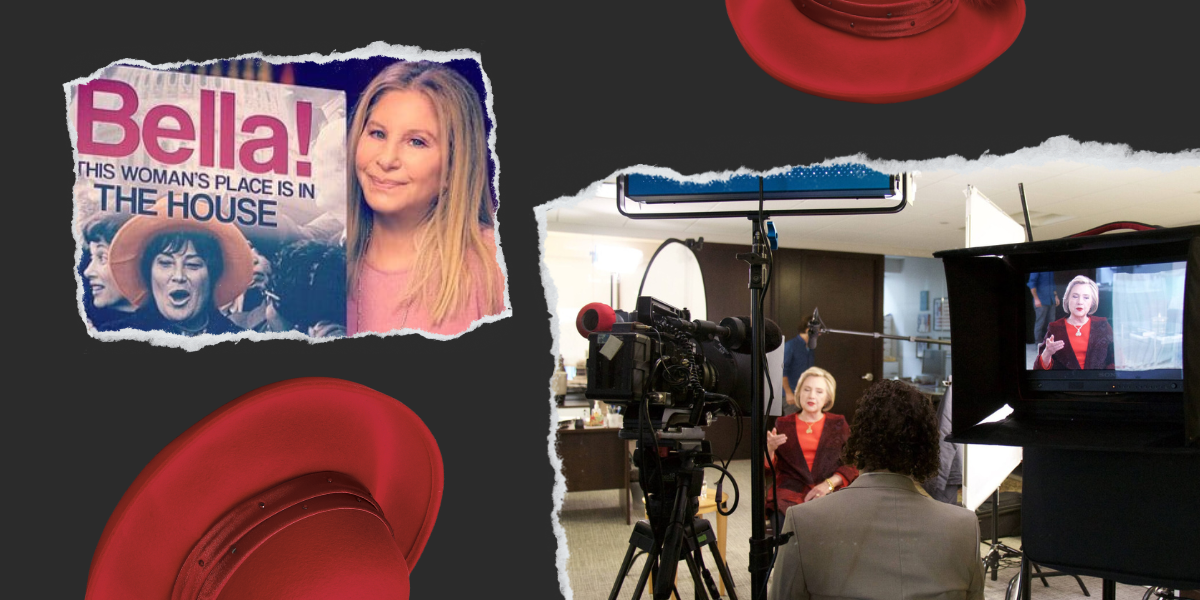Arts
Asking ‘What Would Bella Do?’
|
Hadassah Magazine
Getting your Trinity Audio player ready...
|

Back in the 1970s, Bella Abzug, the feisty Jewish lawyer-turned-politician nicknamed “Battling Bella,” was a force to be reckoned with.
“She was one of the most recognizable faces in Congress, due in part to her trademark branding—her iconic hats,” said documentary filmmaker Jeff L. Lieberman. His recent film, Bella! This Woman’s Place Is in the House, explores the life and legacy of the influential Jewish activist, from her early days growing up in an Orthodox Jewish household in the Bronx to her work as a civil rights lawyer to her career as an activist for progressive causes and politician. She was elected at age 50 to Congress, where she fought for gay rights and women’s rights; her campaign slogan, referenced in the title of the documentary, was “This woman’s place is in the House—the House of Representatives.”
It is hardly surprising that Lieberman was drawn to creating Bella!. The 45-year-old writer and director was raised “in a community filled with strong Jewish women,” he said, part of a strongly affiliated Conservative family in Vancouver, Canada. Growing up, Abzug’s name was not unfamiliar to him, as the American politician’s “orbit filled my 1980s home,” said Lieberman, who now lives in New York. “The books of Letty Cottin Pogrebin and Anita Diamant lined our bookshelves; we sang the songs of Debbie Friedman and were proud to see Gloria Steinem appear on the evening news.”

Both Pogrebin and Steinem were interviewed for the film. And so were many other friends of Abzug who talk about her impact on their lives and careers. Included are politicians like Nancy Pelosi, Maxine Waters, Hilary Clinton and David Dinkins and actors such as Barbra Streisand, Lily Tomlin (who quipped about Abzug “that under the hat was a lot of brain tissue”), Shirley MacLaine and Marlo Thomas. Also among the interviewees are Eve and Liz, Abzug’s daughters with her husband, Martin, who share personal stories from their parents’ lives. The interviews are interspersed with news video and audio clips of Abzug in action as well as newly unearthed home movies and audio diaries.
For all her groundbreaking achievements and influence, Lieberman said, “how is it that so few people know her name, her story or her contributions to the betterment of the world?”
Throughout the filmmaking process, Lieberman said that he was astonished that her legacy is not better known, “not just in the wider world, but even in the Jewish, LGBTQ+ and feminist communities who should be crowning her as a hero. It’s one of the many reasons I set out to make this film—that and a suggestion from my mother.”
Bella! This Woman’s Place Is in the House, which was recently nominated for a 2024 Writers Guild of America award, is making the round of film festivals throughout the United States; for information about local screenings, go to bella1970.com. This interview has been edited for brevity and clarity.
Why is a documentary about Abzug important now?
A documentary about her has always been important. However, at this moment in our country’s history, when the great experiment of democracy is being given its biggest stress test, Abzug is a timely figure. Throughout her many decades, Bella advocated against corruption and the misuse of power. She spoke out against gender inequality and marched for reproductive freedom. She fought for protections for LGBTQ people, defended those wrongfully accused and she felt nobody’s rights were secure until everybody’s rights were achieved.
People used to ask, “What would Bella do?” One only has to watch the documentary to know the answer. She would be organizing daily marches and protests to ensure that these issues do not fade from our attention. She would be working her kitchen telephone encouraging good people to run for office and others to protest and support. These are lessons and values that we hope audiences will receive through watching the film.
By the age of 13, Abzug, who was raised in an Orthodox household, was already giving her first speeches and defying convention at her family’s synagogue when she recited Kaddish for her father. What were her Jewish influences when she was young?
Abzug spoke about being very impacted by her maternal grandfather, an Orthodox Russian Jewish immigrant who spent a great deal of time with her when she was a child. He would bring her to synagogue and teach her Jewish prayers and the Hebrew language. This early influence led to Bella strongly connecting with the Zionist youth organization, Hashomer Hatzair.
She became an active member advocating for the idea of a Jewish state. Bella eventually took courses at the Jewish Theological Seminary and briefly entertained the idea of becoming a rabbi. All of this led to a lifetime of a strong connection to Judaism and Zionism.
Why was she such a strong advocate for Israel?
From an early age, Abzug learned of the importance of a Jewish state as a place of refuge for Jews all around the world. This is not only critical, given the Jewish people’s long history of persecution, but also for the cultural importance of unifying Jewish people in common culture.
As the film points out, Abzug was a huge advocate for Israel but also a huge peace advocate. As Israel continued to militarize in the 1960s and 1970s, Bella felt she had an important role speaking out about the important values of Israel maintaining their independence, but also maintaining a peaceful coexistence with its neighbors. She felt the same way about the United States, speaking out against the Vietnam War and nuclear proliferation. For her, peace was the starting point on all issues.
As you cover in your film, Abzug connected naturally with elderly Jewish voters in New York City’s Lower East Side when the area was added to her congressional district. What did they like about her?
The Jewish voters of the Lower East Side saw Bella as their own daughter. She was familiar to them, and so different from the buttoned-up male politicians of that era. Bella learned the issues that affected them and spent time in the streets and apartment buildings discussing those problems. She spoke Yiddish to them and joked and charmed, and also spoke passionately if someone presented an opposing viewpoint. Bella conveyed to them that she genuinely cared, like a daughter would care about her own family.
Among her many accomplishments, Abzug founded the National Women’s Political Caucus with other leading feminists such as Steinem and Betty Friedan. Why was feminism so important to her?
Abzug saw a huge injustice in the world based on gender lines. She knew that women unifying, organizing and demanding equality was the only way change would take place. Not just for her generation, but for future generations. She learned that through the lessons of the Suffragist movement, and through the power achieved through Women’s Strike for Peace (an activist group that demonstrated against the testing of nuclear weapons). Feminism showed women that they were equal, valuable and deserving of every right available to men. This extended to jobs, housing, mobility and all the freedoms one would associate with being a free person, living in the United States or anywhere else in the world.
Beginning in the mid-1970s, Abzug was a regular attendee of the all-women Feminist Seders with her so-called Seder Sisters, Steinem, Pogrebin and others. What do you know about those events?
Feminist Seders were born out of a desire for Jewish women to be able to discuss Jewish history from a female perspective and have a different approach to often male-dominated narratives of Jewish history. Feminist Seders [which are still held in New York] created a relaxed space for women to be able to equally participate, using the Haggadah as lessons for discussing modern-day issues. It created a free place to bring up nontraditional viewpoints, stories, symbols and discussions that might’ve been absent from traditional seders.
The story of Miriam, for example, is one of celebration and is affirming to all people, but often gets overlooked or overshadowed by the story of Moses. Bella enjoyed this ability to unify her feminism and her Jewishness in a space with other like-minded Jewish women. Feminist Seders have led to other seders being more inclusive, more exploratory, more discussion-based, and have shown Jews all around the world that the seder can be a really meaningful contemporary experience that can address current issues.
In the documentary, Barbra Streisand talks about their relationship, calling Abzug “way ahead of the curve. The rest of us had to catch up.” She joined Abzug’s protests against the Vietnam War. Can you tell us about Streisand’s connection to Abzug?
In the 1960s, Streisand was very much against the Vietnam War but found very few politicians speaking out against it. When she heard a woman named Bella Abzug, who was running for Congress in 1970, saying that the war was immoral, she felt an immediate connection. By chance, the two women met in a restaurant, and she told Bella that she would like to do whatever she could to help Bella’s campaign.
That led to Streisand appearing at a campaign event, where the two women rode down Broadway on a flatbed truck through the Lower East Side, informing voters of Bella’s candidacy for Congress that year. Streisand also headlined a concert for the campaign called “Broadway for Bella.” It was held at the smaller theater at Madison Square Garden and featured several performances by Broadway actors. Both women also spoke about the connection that they felt to each other as Jewish women from New York who had much to say about political issues in New York’s male-dominated political world.
Your previous film also had a Jewish focus, can you talk about it?
Re-emerging: The Jews of Nigeria is a documentary about the Igbo people of Nigeria, specifically the community who are practicing Judaism. The film explores their origins, their beliefs around their connections to Judaism, and shows their amazing commitment to practicing Judaism in a country with very few Jewish resources.
The film follows one particular young man named Shmuel on his difficult journey toward embracing Judaism in the face of much opposition from his family and community.
Susan L. Hornik is a veteran entertainment and lifestyle journalist.










 Facebook
Facebook Instagram
Instagram Twitter
Twitter
Leave a Reply